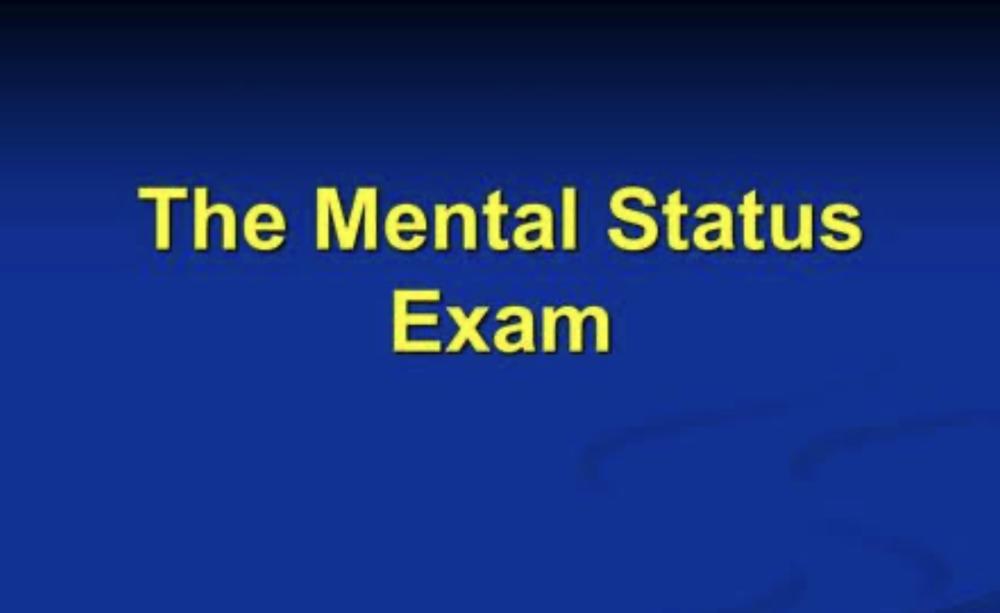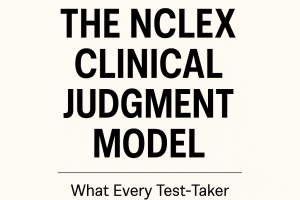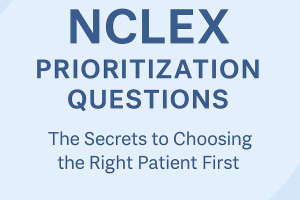THE MENTAL STATUS EXAM: A KEY NCLEX SKILL

Introduction:
Understanding how to assess a patient’s mental status is a vital skill for nurses and a frequent topic on the NCLEX. The Mental Status Exam (MSE) evaluates a patient’s psychological and cognitive functioning, providing crucial insights into their overall health. Whether you’re caring for a patient with a suspected mental health disorder, neurological condition, or medical illness affecting cognition, mastering the MSE ensures accurate assessments and interventions.
In this blog, we’ll break down the components of the MSE, discuss how to effectively conduct one, and explain why this skill is essential for the NCLEX and real-world nursing practice.
1. What Is the Mental Status Exam?
The Mental Status Exam is a structured assessment tool used to evaluate a patient’s current psychological and cognitive state. It covers multiple domains of functioning, such as appearance, behavior, mood, and thought processes.
An MSE helps nurses:
• Identify mental health conditions such as depression, anxiety, or psychosis.
• Detect neurological issues like delirium or dementia.
• Monitor changes in mental status over time.
By systematically assessing each domain, nurses can provide a holistic evaluation that informs diagnosis and treatment.
2. Key Components of the Mental Status Exam:
The MSE consists of several domains, each offering unique insights into a patient’s mental health. Here’s a breakdown of what to assess:
Appearance:
• Observe the patient’s physical presentation, including grooming, hygiene, posture, and clothing.
• Example: Is the patient dressed appropriately for the weather?
Behavior:
• Assess their level of consciousness, eye contact, motor activity, and overall demeanor.
• Example: Are they restless, cooperative, or overly withdrawn?
Speech:
• Note the rate, volume, and coherence of speech.
• Example: Is their speech slurred, rapid, or difficult to understand?
Mood and Affect:
• Mood: Ask the patient how they feel. This is subjective and self-reported.
• Affect: Observe their emotional expression. Is it congruent with their stated mood?
Cognition:
• Test orientation to person, place, time, and situation. Assess attention, memory, and ability to follow commands.
• Example: Can they recall recent events or repeat a short series of numbers?
Thought Process and Content:
• Thought Process: Are their thoughts organized and logical?
• Thought Content: Assess for delusions, hallucinations, or obsessive thoughts.
• Example: Do they express paranoia or describe seeing things that aren’t present?
Perception:
• Evaluate their sensory experience. Are there signs of hallucinations or illusions?
Insight and Judgment:
• Insight: Does the patient understand their condition or situation?
• Judgment: Can they make reasonable decisions?
• Example: If asked what they would do in an emergency, do they provide a rational answer?
Reliability:
• Determine if the patient is providing accurate and consistent information.
3. Conducting a Mental Status Exam:
Performing an MSE requires both observation and direct questioning. Here’s how to approach it:
1. Set the Stage:
Create a comfortable, private environment. Build rapport to ensure the patient feels safe and understood.
2. Start with General Observation:
Watch how the patient enters the room and interacts. This gives clues about their mood, behavior, and cognition.
3. Ask Open-Ended Questions:
Example: “How have you been feeling lately?” or “Can you tell me what brought you here today?”
4. Test Cognitive Domains:
Use simple tasks to evaluate memory and attention.
• Example: Ask them to spell a word backward or recall three objects after a short delay.
5. Document Findings:
Record your observations clearly, avoiding subjective judgments. Focus on factual descriptions.
4. The Role of the Mental Status Exam in Nursing Practice and the NCLEX:
The NCLEX frequently tests knowledge of the MSE, particularly in scenarios involving:
• Psychiatric care (e.g., assessing patients with schizophrenia or bipolar disorder).
• Neurological conditions (e.g., recognizing signs of delirium or dementia).
• Acute medical issues (e.g., evaluating confusion caused by dehydration or infection).
Nurses must recognize abnormal findings and know how to prioritize interventions.
Example NCLEX Scenario:
A nurse assesses a patient with slurred speech, confusion, and difficulty following commands. What should the nurse do first?
• Correct Answer: Perform a focused neurological assessment and alert the healthcare provider, as these symptoms could indicate a stroke.
5. Why the Mental Status Exam Matters:
The MSE isn’t just about ticking boxes—it’s about understanding the person behind the symptoms. A thorough MSE:
• Helps identify underlying causes of altered mental status.
• Guides effective care planning.
• Builds trust and rapport with patients.
In nursing practice, the ability to perform an MSE can make the difference between early intervention and delayed care.
Conclusion:
Mastering the Mental Status Exam is a cornerstone of nursing practice and an essential NCLEX skill. By systematically assessing appearance, behavior, cognition, and other domains, nurses can identify changes in mental health and respond appropriately. Remember, the MSE is more than a test—it’s a tool to connect with patients and deliver compassionate, informed care.
Quiz Questions:
1. What does the MSE domain of cognition evaluate?
a) Emotional expression
b) Orientation and memory
c) Judgment and decision-making
d) Physical appearance
Answer: b) Orientation and memory
2. During the MSE, what does mood refer to?
a) The patient’s observed emotional state
b) The patient’s self-reported feelings
c) The patient’s behavior during the exam
d) The patient’s ability to make decisions
Answer: b) The patient’s self-reported feelings
3. What is a primary purpose of the MSE?
a) To diagnose mental illnesses
b) To evaluate psychological and cognitive functioning
c) To prescribe medications
d) To monitor physical symptoms only
Answer: b) To evaluate psychological and cognitive functioning
4. Which of the following is an example of abnormal thought content?
a) Organized and logical responses
b) Paranoia or delusions
c) Appropriate emotional expression
d) Cooperative behavior
Answer: b) Paranoia or delusions
5. A patient reports hearing voices that no one else can hear. Under which domain of the MSE would this be documented?
a) Mood and affect
b) Perception
c) Insight
d) Thought process
Answer: b) Perception






